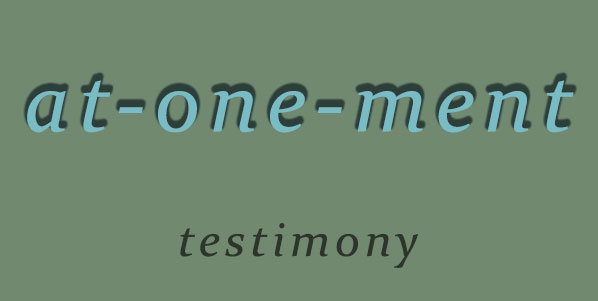When planning the Atonement series for our home fellowship group (ugh – what awful terminology) I started off by getting the members to give their testimonies. I had thought this would take two sessions, and I wasn’t wrong. In all eight people shared something of their various journeys to faith and it was really, really helpful. I deliberately didn’t give them much of a steer – just ‘take as long as you want’.
Most people started with ‘my testimonial isn’t very interesting’ or ‘mine isn’t very dramatic’ or some such phrase.
This in itself was worth pausing on. Sure, none of us had a ‘road to Damascus’ experience, but everyone could speak of the involvement of other people – friends and family in a nutshell. This is no surprise at all of course. For me it was the input of a girl from the school over the road (!) a boy who seemed very clever indeed (and later became a Methodist Minister) and an 85 year old lady, Miss Rose who led a tiny bible study and clearly had something important to say.

If you listen to people speaking about their faith you can learn a lot about their theology – that’s a given really. Within the group of eight ideas around atonement did crop up, but not as much as I had expected. Some spoke of ‘this God who died for me’ and the need for forgiveness. No one went into any sort of explanation about how this forgiveness might have worked and not everybody mentioned these ideas.
This was a little unexpected. I had thought that people might put more emphasis on this. In discussion about this later, one of the group said ‘I just assumed everybody knew all that’. So, a whopping great big ‘confounding factor’ in the midst of my research. I had wondered if people would voice some version of the standard model in their testimony. In reality, they didn’t.
It seems I needed to give a more direct question in order to get at clearer explanations of what people really thought. I had wanted to see what role theology (and specifically soteriology – study of salvation) played in ‘coming to Christ’ (another awful expression).
Some years ago I met a man who had led, by his own admission, shall we say, something of ‘wild’ lifestyle. His ‘conversion’ included a deep and profound sense of his own shame. This sticks in my mind because it was different to my own journey, and clearly very significant for the man. It has also been something that, looking back, I have not heard spoken about very often. At college I did a ‘spiritual formation’ module during which I discovered that there are people who have researched the stages that Christians go through on their journeys of faith. It was very enlightening, and became very helpful for me. It would be interesting to look at the research with a view to atonement theology within peoples’ conversion experience.
Who knows? But it sure is interesting!
Next up is why was their an atonement anyway?



